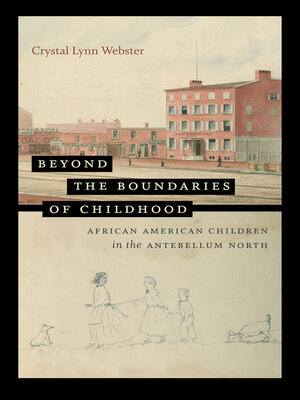Beyond the Boundaries of Childhood
ebook ∣ African American Children in the Antebellum North · The John Hope Franklin Series in African American History and Culture
By Crystal Lynn Webster

Sign up to save your library
With an OverDrive account, you can save your favorite libraries for at-a-glance information about availability. Find out more about OverDrive accounts.
Find this title in Libby, the library reading app by OverDrive.



Search for a digital library with this title
Title found at these libraries:
| Library Name | Distance |
|---|---|
| Loading... |
For all that is known about the depth and breadth of African American history, we still understand surprisingly little about the lives of African American children, particularly those affected by northern emancipation. But hidden in institutional records, school primers and penmanship books, biographical sketches, and unpublished documents is a rich archive that reveals the social and affective worlds of northern Black children. Drawing evidence from the urban centers of Boston, New York, and Philadelphia, Crystal Webster’s innovative research yields a powerful new history of African American childhood before the Civil War. Webster argues that young African Americans were frequently left outside the nineteenth century’s emerging constructions of both race and childhood. They were marginalized in the development of schooling, ignored in debates over child labor, and presumed to lack the inherent innocence ascribed to white children. But Webster shows that Black children nevertheless carved out physical and social space for play, for learning, and for their own aspirations.
Reading her sources against the grain, Webster reveals a complex reality for antebellum Black children. Lacking societal status, they nevertheless found meaningful agency as historical actors, making the most of the limited freedoms and possibilities they enjoyed.
Reading her sources against the grain, Webster reveals a complex reality for antebellum Black children. Lacking societal status, they nevertheless found meaningful agency as historical actors, making the most of the limited freedoms and possibilities they enjoyed.







